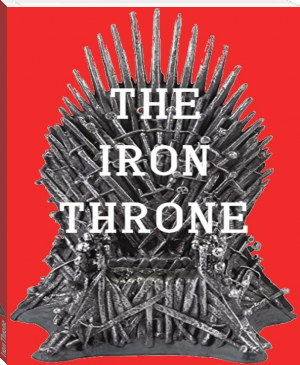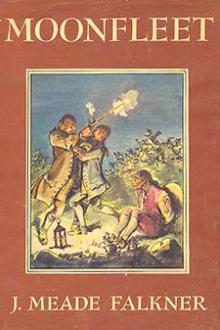Iron Throne, Ellen Gould-Harmon [rm book recommendations txt] 📗

- Author: Ellen Gould-Harmon
Book online «Iron Throne, Ellen Gould-Harmon [rm book recommendations txt] 📗». Author Ellen Gould-Harmon
When the Thessalonian church received erroneous views concerning the coming of Christ, the apostle Paul counselled them to test their hopes and anticipations carefully by the word of God. He cited them to prophecies revealing the events to take place before Christ should come, and showed that they had no ground to expect Him in their day. "Let no man deceive you by any means" (2 Thessalonians 2:3), are his words of warning. Should they indulge expectations that were not sanctioned by the Scriptures, they would be led to a mistaken course of action; disappointment would expose them to the derision of unbelievers, and they would be in danger of yielding to discouragement and would be tempted to doubt the truths essential for their salvation.
The apostle's admonition to the Thessalonians contains an important lesson for those who live in the last days. Many Adventists have felt that unless they could fix their faith upon a definite time for the Lord's coming, they could not be zealous and diligent in the work of preparation. But as their hopes are again and again excited, only to be destroyed, their faith receives such a shock that it becomes well-nigh impossible for them to be impressed by the great truths of prophecy. The preaching of a definite time for the judgment, in the giving of the first message, was ordered by God. The computation of the prophetic periods on which that message was based, placing the close of the 2300 days in the autumn of 1844, stands without impeachment.
The repeated efforts to find new dates for the beginning and close of the prophetic periods, and the unsound reasoning necessary to sustain these positions, not only lead minds away from the present truth, but throw contempt upon all efforts to explain the prophecies. The more frequently a definite time is set for the second advent, and the more widely it is taught, the better it suits the purposes of Satan. After the time has passed, he excites ridicule and contempt of its advocates, and thus casts reproach upon the great advent movement of 1843 and 1844. Those who persist in this error will at last fix upon a date too far in the future for the coming of Christ. Thus they will be led to rest in a false security, and many will not be undeceived until it is too late.
The history of ancient Israel is a striking illustration of the past experience of the Adventist body. God led His people in the advent movement, even as He led the children of Israel from Egypt. In the great disappointment their faith was tested as was that of the Hebrews at the Red Sea. Had they still trusted to the guiding hand that had been with them in their past experience, they would have seen the salvation of God. If all who had laboured unitedly in the work in 1844, had received the third angel's message and proclaimed it in the power of the Holy Spirit, the Lord would have wrought mightily with their efforts. A flood of light would have been shed upon the world. Years ago the inhabitants of the earth would have been warned, the closing work completed, and Christ would have come for the redemption of His people.
It was not the will of God that Israel should wander forty years in the wilderness; He desired to lead them directly to the land of Canaan and establish them there, a holy, happy people. But "they could not enter in because of unbelief." Hebrews 3:19. Because of their backsliding and apostasy they perished in the desert, and others were raised up to enter the Promised Land. In like manner, it was not the will of God that the coming of Christ should be so long delayed and His people should remain so many years in this world of sin and sorrow. But unbelief separated them from God. As they refused to do the work which He had appointed them, others were raised up to proclaim the message. In mercy to the world, Jesus delays His coming, that sinners may have an opportunity to hear the warning and find in Him a shelter before the wrath of God shall be poured out.
Now as in former ages, the presentation of a truth that reproves the sins and errors of the times will excite opposition. "Everyone that doeth evil hateth the light, neither cometh to the light, lest his deeds should be reproved." John 3:20. As men see that they cannot maintain their position by the Scriptures, many determine to maintain it at all hazards, and with a malicious spirit they assail the character and motives of those who stand in defense of unpopular truth. It is the same policy which has been pursued in all ages. Elijah was declared to be a troubler in Israel, Jeremiah a traitor, Paul a polluter of the temple. From that day to this, those who would be loyal to truth have been denounced as seditious, heretical, or schismatic. Multitudes who are too unbelieving to accept the sure word of prophecy will receive with unquestioning credulity an accusation against those who dare to reprove fashionable sins. This spirit will increase more and more. And the Bible plainly teaches that a time is approaching when the laws of the state will so conflict with the law of God that whosoever would obey all the divine precepts must brave reproach and punishment as an evildoer.
In view of this, what is the duty of the messenger of truth? Shall he conclude that the truth ought not to be presented, since often its only effect is to arouse men to evade or resist its claims? No; he has no more reason for withholding the testimony of God's word, because it excites opposition, than had earlier Reformers. The confession of faith made by saints and martyrs was recorded for the benefit of succeeding generations. Those living examples of holiness and steadfast integrity have come down to inspire courage in those who are now called to stand as witnesses for God. They received grace and truth, not for themselves alone, but that, through them, the knowledge of God might enlighten the earth. Has God given light to His servants in this generation? Then they should let it shine forth to the world.
Anciently the Lord declared to one who spoke in His name: "The house of Israel will not hearken unto thee; for they will not hearken unto Me." Nevertheless He said: "Thou shalt speak My words unto them, whether they will hear, or whether they will forbear." Ezekiel 3:7; 2:7. To the servant of God at this time is the command addressed: "Lift up thy voice like a trumpet, and show My people their transgression, and the house of Jacob their sins."
So far as his opportunities extend, everyone who has received the light of truth is under the same solemn and fearful responsibility as was the prophet of Israel, to whom the word of the Lord came, saying: "Son of man, I have set thee a watchman unto the house of Israel; therefore thou shalt hear the word at My mouth, and warn them from Me. When I say unto the wicked, O wicked man, thou shalt surely die; if thou dost not speak to warn the wicked from his way, that wicked man shall die in his iniquity; but his blood will I require at thine hand. Nevertheless, if thou warn the wicked of his way to turn from it; if he do not turn from his way, he shall die in his iniquity; but thou hast delivered thy soul." Ezekiel 33:7-9.
The great obstacle both to the acceptance and to the promulgation of truth is the fact that it involves inconvenience and reproach. This is the only argument against the truth which its advocates have never been able to refute. But this does not deter the true followers of Christ. These do not wait for truth to become popular. Being convinced of their duty, they deliberately accept the cross, with the apostle Paul counting that "our light affliction, which is but for a moment, worketh for us a far more exceeding and eternal weight of glory;" with one of old, "esteeming the reproach of Christ greater riches than the treasures in Egypt." 2 Corinthians 4:17; Hebrews 11:26.
Whatever may be their profession, it is only those who are world servers at heart that act from policy rather than principle in religious things. We should choose the right because it is right, and leave consequences with God. To men of principle, faith, and daring, the world is indebted for its great reforms. By such men the work of reform for this time must be carried forward. Thus saith the Lord: "Hearken unto Me, ye that know righteousness, the people in whose heart is My law; fear ye not the reproach of men, neither be ye afraid of their revilings. For the moth shall eat them up like a garment, and the worm shall eat them like wool: but My righteousness shall be forever, and My salvation from generation to generation." Isaiah 51:7, 8.
Chapter 27. RevivalWherever the word of God has been faithfully preached, results have followed that attested its divine origin. The Spirit of God accompanied the message of His servants, and the word was with power. Sinners felt their consciences quickened. The "light which lighteth every man that cometh into the world" illumined the secret chambers of their souls, and the hidden things of darkness were made manifest. Deep conviction took hold upon their minds and hearts. They were convinced of sin and of righteousness and of judgment to come. They had a sense of the righteousness of Jehovah and felt the terror of appearing, in their guilt and uncleanness, before the Searcher of hearts. In anguish they cried out: "Who shall deliver me from the body of this death?" As the cross of Calvary, with its infinite sacrifice for the sins of men, was revealed, they saw that nothing but the merits of Christ could suffice to atone for their transgressions; this alone could reconcile man to God. With faith and humility they accepted the Lamb of God, that taketh away the sin of the world. Through the blood of Jesus they had "remission of sins that are past."
These souls brought forth fruit meet for repentance. They believed and were baptized, and rose to walk in newness of life--new creatures in Christ Jesus; not to fashion themselves according to the former lusts, but by the faith of the Son of God to follow in His steps, to reflect His character, and to purify themselves even as He is pure. The things they once hated they now loved, and the things they once loved they hated. The proud and self-assertive became meek and lowly of heart. The vain and supercilious became serious and unobtrusive. The profane became reverent, the drunken sober, and the profligate pure. The vain fashions of the world were laid aside. Christians sought not the "outward adorning of plaiting the hair, and of wearing of gold, or of putting on of apparel; but . . . the hidden man of the heart, in that which is not corruptible, even the ornament of a meek and quiet spirit, which is in the sight of God of great price." 1 Peter 3:3, 4.
Revivals brought deep heart-searching and humility. They were characterized by solemn, earnest appeals to the sinner, by yearning compassion for the purchase of the blood of Christ. Men and women prayed and wrestled with God for the salvation of souls. The fruits of





Comments (0)